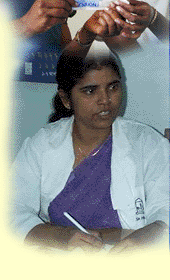
PRIME II helped a wider range of primary providers reach more people with critical family planning and reproductive health (FP/RH) services by:
- Building the capacity of non-traditional cadres such as volunteer health promoters and pharmacy agents
- Helping countries expand service delivery in postabortion care, prevention of mother-to-child transmission of HIV, and prevention of postpartum hemorrhage
- Assisting large-scale in-service training and pre-service education programs
- Supporting providers through national policies and protocols.
Key Results
-
Kenya: To address high rates of maternal mortality and morbidity due to unsafe and incomplete abortion, PRIME II trained private-sector nurse-midwives working in three of Kenya’s seven provinces in postabortion care including emergency treatment and family planning counseling and services. By the end of the two-year project, 155 trained providers had successfully treated 1,603 women with postabortion complications using manual vacuum aspiration and counseled 81% of these women in family planning, resulting in 56% leaving with or agreeing to return for a FP method.
-
Benin, Ethiopia, Mali: PRIME II trained more than 300 providers in active management of the third stage of labor (AMTSL), a recommended practice that significantly reduces the incidence of life-threatening postpartum hemorrhage. Vaginal births with AMTSL at project facilities increased from 0% to 76% in Benin, 1% to 90% in Ethiopia, and 0% to 55% in Mali.
-
Paraguay: PRIME II provided technical assistance to the Quality Project, which supported the Ministry of Health in three regions to improve family planning counseling and services. Providers significantly improved their performance in five priority areas (counseling, informed consent, technical competence, client-provider interaction and availability of methods): from 36% of tasks performed to standard at baseline to 80% at final evaluation.
-
Nicaragua: PRIME II trained over 160 traditional birth attendants (TBAs), physicians, nurses and community leaders to help reduce high maternal mortality levels in the Jinotega region by strengthening provider and community preparation for deliveries and obstetric emergencies. Observation by experts and consumers documented significantly improved maternal care practices by providers including a 20% improvement in management of postpartum hemorrhage and a dramatic reduction in TBAs using injections to “hurry labor” (3.6 times less than at baseline).
-
India: Three cadres of primary providers of FP/RH services were trained and supported with assistance from PRIME II in wide areas of Uttar Pradesh, India’s most populous state. All cadres consistently achieved high levels of performance to standard: traditional birth attendants (86% of 6,948 assessed), Indigenous System of Medicine practitioners (81% of 12,162 assessed), and Auxiliary Nurse-Midwives/Lady Health Visitors (92% of 6,728 assessed).
-
Rwanda: Even when necessary drugs are available, prevention of mother-to-child transmission (PMTCT) of HIV in Rwanda is a major challenge, especially since less than a third of all deliveries are assisted by skilled personnel. PRIME II helped providers improve and increase voluntary counseling and testing (VCT) of prenatal clients at three hospitals and two health centers. The interventions achieved high rates of counseling and testing for women: 98% of 9,501 women attending prenatal care between March 2002 and May 2004 were counseled; 94% of women counseled accepted an HIV test, and 90.5% of the women tested waited or returned for test results. Campaigns to reach women’s husbands or sexual partners through discreet letters of invitation to VCT services also showed promising gains, with 99% of 2,012 partners counseled accepting an HIV test.
|











